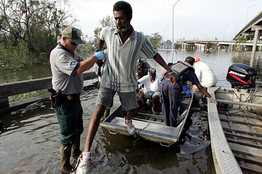A Tale of Two Disasters
Bush was blamed for local failures after Katrina. Obama got a free ride for weeks as federal failures mounted during the Gulf spill.
By
PAUL H. RUBIN
WSJ.com
In many respects, the Deepwater Horizon disaster and Katrina are mirror images of each other. The harm from Katrina was on state land—mainly Louisiana, but also Florida, Alabama and Mississippi. As a result, President George W. Bush and the federal government were limited in what they could do. For example, Homeland Security Secretary Michael Chertoff wanted to take command of disaster relief on the day before landfall, but Louisiana Gov. Kathleen Blanco refused. Federal response was hindered because the law gave first authority to state and local authorities.
State and local efforts—particularly in New Orleans, and Louisiana more broadly—interfered with what actions the federal government could actually take. New Orleans Mayor Ray Nagin was late in ordering an evacuation and did not allow the use of school buses for evacuation, which could have saved hundreds of lives. President Bush had no power to change that decision.
The Deepwater Horizon oil spill is on federal offshore territory. The federal government has primary responsibility for handling the situation, while state and local governments remain limited in what they can do. For example, the Environmental Protection Agency has repeatedly changed its mind regarding the chemical dispersants that Louisiana is allowed to use. In the Florida Panhandle, Okaloosa County officials voted to disregard any restrictions from higher branches of government and allow its own emergency management team to do what it views as best, such as creating an underwater "air curtain" of bubbles to push oil to the surface, and using barges to block the oil once it rises. They believe that the federal government is undermining their efforts.
As opposed to Katrina, state and local attempts to address the oil spill have been hindered by an ineffectual and chaotic federal response.
The Coast Guard has played an important role in both disasters. During Katrina, it rescued over 33,000 stranded people and received commendations from the president and Congress. In the current disaster, the Coast Guard has received widespread criticism for forbidding 16 barges from skimming oil because they were not inspected for life preservers. Louisiana Gov. Bobby Jindal tried to get the barges working, but was for a long time unable to convince the Coast Guard to permit them to deploy.
Two days after Katrina's landfall, Mr. Bush suspended the Jones Act (which restricts the ability of non-American ships to work in U.S. waters) to allow assistance for Katrina victims. During Katrina, over 70 foreign countries pledged emergency assistance. In the current situation, President Barack Obama has not suspended the Jones Act. Many countries such as the Netherlands, which would like to help and have expertise in cleaning oil spills, can offer only limited relief. This is significantly delaying the cleanup.
The Jones Act, which requires American crews, is a favorite of organized labor, a major supporter of Mr. Obama.
Mr. Bush was a Republican, and elected Democrats controlled Louisiana and New Orleans, the main victims of Katrina. Many claimed Mr. Bush neglected New Orleans for this reason. Mr. Obama is a Democrat, and the states affected by Deepwater Horizon—Louisiana, Alabama, Mississippi, and Florida—all have Republican governors. I have not seen anyone, even on the right, claim that the ineffectual response of the Obama administration is due to partisan politics.
The final difference is in the press handling of the two issues.
Mr. Bush responded quickly to Katrina but was handicapped by regulations giving power to the states. Nonetheless, the federal response was well coordinated and helpful overall. But Mr. Bush was rapidly and widely blamed for the result of Katrina and for failures that actually occurred at other levels of government.
Now Mr. Obama has much more power than did Mr. Bush, but the federal response is ineffective and often stands in the way of those in the best position to know what to do. It is only in the last week or two that the mainstream press has voiced any criticism of Mr. Obama.
This is because the media's default position for Mr. Bush was "Bush is wrong," and it sought stories aimed at justifying this belief. For Mr. Obama the media's default is "Obama is right," and it takes a powerful set of facts to move it away from this assumption. As oil continues to gush from the unplugged well, this set of facts has unfortunately come to the fore.
Mr. Rubin is a professor of economics at Emory University, and held
several senior government positions in the 1980s. He has a summer residence
on the Florida Panhandle, where he is fearfully awaiting the arrival of the
oil.
